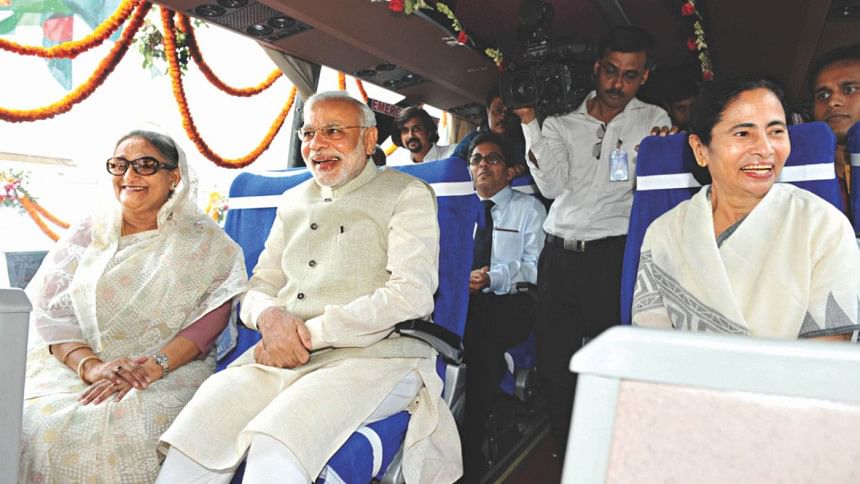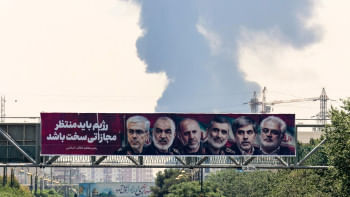Modi's charm offensive in Dhaka

Indian Prime Minister Narendra Modi's visit to Bangladesh comes a year after Modi took office. Soon after BJP won a landslide victory, Modi dispatched External Affairs Minister Sushma Swaraj to Dhaka in June 2014. Earlier Bangladesh Parliament Speaker Dr. Shirin Sharmin Chuadhury represented Bangladesh at Modi's swearing-in ceremony in May 2014.
When Modi met Prime Minister Sheikh Hasina in New York in September 2014 and in Kathmandu in November 2014, he told Hasina to have trust in him. All these contacts at the highest level laid the foundation for Bangladesh-India relations to move forward.
To make the visit meaningful, Modi focused on two important issues that Bangladesh had been waiting for – the Land Boundary Agreement (LBA) and Teesta Water Sharing Treaty. Since Chief Minister of West Bengal Mamata Banerjee was still not on board over the Teesta Treaty, Modi gave his full attention to the LBA. After some drama in the Indian Parliament, Modi steered the LBA bill through both houses of the Parliament and got it passed without any dissenting vote. He was thus armed with a 'gift' that Bangladesh was waiting for four decades.
The impression that Bangladesh got everything from the LBA and India got nothing is not correct. India too has gained a lot by settling this long perplexing problem.
The 22 documents signed by the two countries broadly involve the following sectors –commerce; connectivity; finance; administrative cooperation; and cultural.
The significant ones are – exchange of Instruments of Ratification of 1974 LBA and modalities for its implementation; $2 billion new line of credit; connecting Dhaka with Agartala and Guwahati by road; renewal of trade agreement; use of Bangladesh ports; and setting up of Indian Economic Zones. India's Reliance Power and Adani Power signed deals with the Bangladesh Power Development Board to invest $5.5 billion to generate 4,600 Megawatts of electricity.
From a closer look it would appear that Bangladesh has opened its doors for wide ranging economic cooperation based on connectivity. There, however, are some missing links.
Chief Minister Mamata Banerjee, who arrived a day earlier, was with Modi and Sheikh Hasina to flag off the bus service to Guwahati and Agartala. Mamata was also present at the handing over of the LBA ratification documents.
Through these bus services, Bangladesh has effectively given road transit to India, a long standing Indian demand. This road connectivity will naturally be extended to carrying goods by rail from mainland India to North Eastern states through Bangladesh. What will be Bangladesh's financial gain? We shall have to wait and see.
What is missing in connectivity is the air connection between Dhaka and Guwahati and Agartala. That probably would have contributed more in developing tourism. Road connectivity will be workable only if the Indian High Commission in Dhaka makes it easy for Bangladeshis to get visas to go to these destinations. However, connectivity will create security challenges for both countries.
The line of credit will be used mostly to upgrade and build new infrastructure, particularly roads and railways. Connectivity through Bangladesh should give the much needed boost to the depressed economies of the seven North Eastern States. Bangladesh should have asked for 'Bangladesh Economic Zones' in Tripura and Assam.
Although Modi assured Hasina to do everything to reduce the massive trade imbalance, there was no specific MOU. Though this is not a big problem in accounting terms, it does have political implications in Bangladesh. A look at the figures of the past two years is distressing. In 2013-14, Bangladesh could send goods worth $457 million to India, while Indian exports to Bangladesh were worth over $6 billion. During 2014-15 (up to March), Bangladesh exported goods worth $396 million to India and India has already exported $4.5 billion to our country.
The North Eastern States offer a ready market for Bangladeshi products. India needs to remove non-tariff barriers quickly and allow Bangladeshi exports to enter North East India. This will help reduce the huge trade imbalance.
Modi's visit would have been a complete success had he been able to deliver on the Teesta Treaty. India must not forget that as a lower riparian country, it is having serious problems with China over dams built on the upper reaches of Brahmaputra. Bangladesh, India and Nepal need to seriously engage to manage waters of the Ganges-Brahmaputra basin for the benefit of the people of the region. According to some reports, the Teesta Treaty will be concluded when Sheikh Hasina next visits Delhi.
India's policy towards Bangladesh could be motivated by a number of reasons.
Modi's visit came on the heels of Chinese Vice-Premier Liu Yangdong's visit in May, when six MOUs were signed to strengthen bilateral ties. India is deeply worried that China has made deep inroads in South Asia with massive economic assistance. Besides, Bangladesh has shown great interest in China's One Belt One Road (OBOR) development paradigm. India deeply mistrusts OBOR, as it feels it is a Chinese ploy to encircle and undermine India. Pakistan is a frontline state of OBOR. India clearly wants to allay Chinese influence in South Asia, particularly on its eastern front. Besides, Bangladesh is central to India's 'Act East' policy.
The other reason is that Bangladesh does not believe in state terrorism. Despite all the odds, Bangladesh has consistently expanded its economy over the past decades and is a lucrative market.
The visit has gone smoothly. Bangladesh has given a very warm welcome to the Indian leader. Modi has charmed everyone with his tweets and statements. Apart from official engagements, Modi took the time to meet BNP chief Khaleda Zia and several other political leaders.
Interestingly, the Indian media, which is traditionally dismissive about news on Bangladesh, has given wide coverage to Modi's visit. Most of the editorials in major newspapers have projected Bangladesh positively.
What is surprising is that Modi, a leader of the ultra-nationalist BJP, has drawn a line between himself and the RSS and has successfully projected a mellow, secular image.
Modi's visit has put Bangladesh-India relations on a higher pedestal. He has truly behaved like an 'elder brother' and not a 'big brother'. To carry forward this relationship, the trust that has been built must continue as between two friends.
The writer is a former Ambassador and Secretary.

 For all latest news, follow The Daily Star's Google News channel.
For all latest news, follow The Daily Star's Google News channel. 



Comments